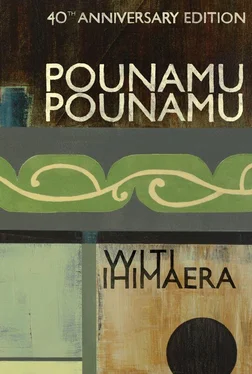In short, we are informed that Pakeha bystanders can easily brush aside concepts of ‘manawa’ and ‘whanau’, but that, in doing so, they place themselves outside Maori experience. And despite its smiling face, ‘The Other Side of the Fence’ delivers a sharp message when the English wife in the story reflects on how misunderstood she is for criticising the Heremaia children next door:
… she at least tried to keep the bad behaviour of the Heremaia children in context. They were not always bad.
As the reading public absorbed the stories, there was much that was going on in the Ihimaera lives, and in literary life in general. The ground was shifting, in a way that at first was almost indiscernible. Robin Dudding left Landfall and moved to Auckland, visiting us en route. Witi was among the several writers who came over to Hataitai and talked far into the night, discussing Robin’s plans for a new periodical, Islands , which would free him of the constraints he had felt at Caxton Press to publish and be damned, as it were.
Meanwhile, New Zealand’s best-known book lover, the Labour Prime Minister Norman Kirk, read Pounamu Pounamu and invited Witi to join Foreign Affairs as a diplomat, a post he accepted. Witi and Jane moved house to Roy Street on the fringe of Newtown, a street with old-world, well-kept charm, enhanced by rows of magnolia trees forming an avenue, glorious in spring. We picked out the Ihimaera house easily, next door to an imposing bust of Bertrand Russell, as we approached.
But if the Roy Street house looked outwardly peaceful, the conversation inside was decidedly colourful. Now, when we visited, we found Maori intellectuals and teachers in heated discussion, formulating ways for change. I found myself being challenged on more than one occasion, and doubts had begun to creep in to my own belief that I could write from a Maori perspective. The mood was charged, radical and often decidedly subversive.
That year, too, Pounamu Pounamu was placed third at the 1973 Wattie Book of the Year Award. What happened there carried a potent message. The sponsor was Sir James Wattie, famous for his canned-food processing plant in the Gisborne area, where Witi’s family lived, and a well-known horse breeder as well. When Witi stepped forward to receive his prize, Sir James shook his hand, and said: ‘Oh, a lot of your people work for me, Mr … uh, uh,’ and here he stumbled helplessly.
‘Ihimaera,’ Witi said, the smile never leaving his face. ‘It has the same number of syllables as your racehorse, Even Stevens.’
The following month, Robin published a new story of Witi’s in Islands , called ‘Clenched Fist’. A friend comes to visit the narrator in his office. Some tourists had just taken the friend’s photo out of a bus window.
He was sitting on George’s desk at work. Afro hair and air of brooding ruthlessness. Leather jacket scrawled with a peace sign. Dark glasses. Round his neck, Mexican beads.
— I could have mangled the white bastard. I tell you, brother, we’re just objects, caged animals in a zoo, entertainment for the tourists. Bloody Yanks, yeah.
He fumbled at George’s smokes, lit one and puffed angrily.
Later, as the story progresses, he accuses the narrator of being ‘Middle class Maori. Suit. Tie. Aura of conservatism. Antiseptic. Sold out to the pakeha. Uncle Tom.’ They continue on, the narrator reminding his friend that, like him, he has Pakeha blood in his veins. An uneasy truce descends, although the quarrel is unresolved. The narrator walks out into the street, where a woman is nearly knocked down by a speeding car. The occupants shout, ‘Get back. Get back you black bitch.’ The bystanders are amused, except for the narrator, who stands trembling with rage. Without thinking, he raises a clenched fist to the sun.
I was one of the judges the following year when Tangi , written in London three years earlier, won the Wattie Book Awards. It was a day to remember. Because of fog, the Wellington — Christchurch flight was delayed. Witi, Jane and I, along with the other two award winners, set off in a light plane to Blenheim, and from there by car to Christchurch. We didn’t make it in time for the awards ceremony. Witi and Jane were preoccupied with the news that they were expecting their first child. I remember that, while Witi was overjoyed by this development, he was at times a little withdrawn. When he learned that he had won first prize, a look of shock passed over his face. I wondered, for a moment, if it was something he didn’t really want.
A year or two later he wrote to me from Canberra, where he had taken up a diplomatic posting, and told me that what he loved about being in another country was the feeling of anonymity; that being so well known in New Zealand had become hard. I still didn’t see it coming, but I should have. The yellow brick road had got rocky. Although there were still two more books to appear, a time of silence was about to descend. The last book stemming from that period was The New Net Goes Fishing , another collection of short stories that included ‘Clenched Fist’. For ten years Witi would place himself in publishing exile, for the most part observing his country in private, and from afar. From 1977 until the publication of The Matriarch in 1986, Witi published no more books. When he emerged, it was from a position of strength and commitment to the season of change that had been envisaged in the house in Newtown. What I had witnessed, through these unfolding events, was a man defining himself not just as a ‘Maori writer’ but maturing as a radical thinker and reformer.
He and I have often joined forces. We were at each other’s side the night when, with a wider group of writers, we stopped the proceedings in Parliament during the 1981 Springbok tour. We did this by the simple expedient of entering the public gallery, donning black armbands, and reciting the Speaker’s prayer as the evening sitting began, thereby breaking the rules of Parliament which require that the Speaker’s prayer be heard in silence. After the police had evicted the group, we were collectively banned from Parliament for a year.
This act of solidarity seemed like a seal on our friendship, one that remains steadfast to this day, despite many changes in our circumstances. Forty years on, there is no doubt in my mind that Pounamu Pounamu is among the most important books published in this country. Its influence on bicultural understanding cannot be underestimated. That it remains consistently in print after so many years is a testimony to the way we as a people began to re-evaluate, and ultimately reinvent ourselves. It has been through many appraisals and reappraisals by critics and by the writer himself. Ultimately, it is both the healing touch and the fire that burns.
Fiona Kidman
Introduction
to this edition
E kore au e ngaro
He kakano i ruiruia mai
i Rangiatea
Enga rangatira ma, tena koutou katoa.
Pounamu Pounamu was published in 1972 and was my first book. The stories in it are about growing up Maori during ‘the greenstone years’ of my childhood: those years when the rural village and the marae were the centre of our universe. I called the book after the treasured jade which is symbolic of those things in life that are to be prized above all others.
I honour the stories of Pounamu Pounamu and, when I hold the jade up to the light, it is just as strong, translucent and beautiful as ever. Ten years ago, in 2002, however, I saw that the light refracted just a little differently and I was able to see more of the roimata toroa, the tears, that are in the jade. They are the dark markings that have always resided there but how you see them and what you see in them all depends on your point of view. Thus, although the stories in this edition of Pounamu Pounamu are the same as in the original edition published, they are also different. I have added what I have seen as the light has glanced off, reflected through and highlighted other roimata in the depths of the greenstone. I’ve rewritten the stories, to show that not only is pounamu a living stone but stories also live, change and are enriched by the dynamic of changing times.
Читать дальше












